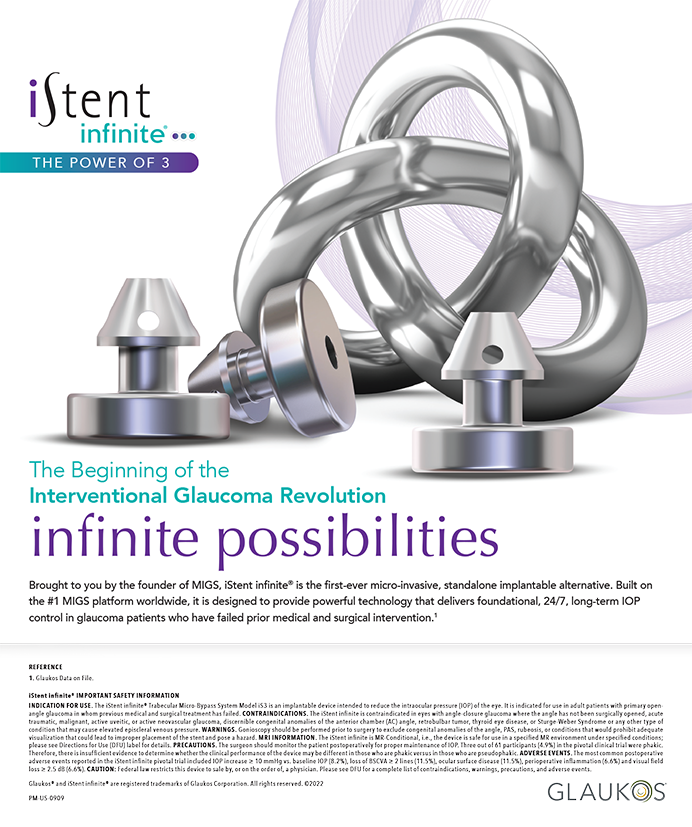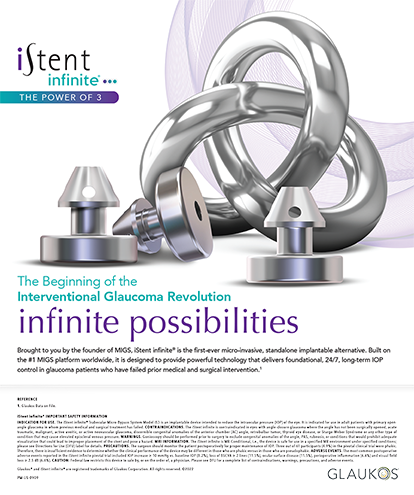In a virtual episode, Dr. Sheybani discussed data comparing the corneal endothelial safety of three MIGS devices: iStent inject (Glaukos), Hydrus Microstent (Alcon), and CyPass Micro-Stent (Alcon).
In an analysis looking at 5-year data from the pivotal trials of each device, there was no significant difference in endothelial cell loss (ECL) among patients receiving an iStent inject at the time of phacoemulsification compared to phacoemulsification alone.1 Furthermore, the study on the Hydrus Microstent reported higher ECL in the device plus phacoemulsification group compared to phacoemulsification alone (control) in the first 3 months, but a rate of ECL that mirrored control after 3 months. The study authors reported that the highest ECL rate was in the 5-year data on the CyPass Micro-Stent, with accelerated loss after 2 years. For the study, clinically significant ECL was defined as >30% (Figure 1).

Figure 1. Recorded data of proportion of eyes with ≥30% endothelial cell loss versus preoperative.
“The whole purpose that we embarked on was to try to get a sense of what was the difference in not only total loss, but the rate of ECL over time of three different MIGS options that are implantable,” said Dr. Sheybani, who was a co-author on the analysis. “Whether it was the iStent inject study or the Hydrus study, patients didn't hit that 30% loss rate over 5 years. The CyPass group got close. It was in the high twenties, like 27%, but the key difference that you have to look at is what is the trend and what does that look like over time?”
The analysis also looked at data on endothelial cell density (ECD) reported in the devices’ respective pivotal trials. In the study on iStent inject, mean ECD was comparable at all time points between the iStent inject plus phacoemulsification group and the phacoemulsification only group. Meanwhile, the data on Hydrus Microstent indicated a significant initial reduction in mean ECD in the group of patients undergoing Hydrus Microstent and phacoemulsification surgery compared to phacoemulsification alone. But beyond the initial postoperative period, there was no difference in ECL rates compared to phacoemulsification alone. By comparison, there was a significant and progressive reduction in mean ECD among recipients of the Cy-Pass device after 2 years (Figure 2).

Figure 2. The measured mean ECD across all three trials.
Dr. Sheybani summarized his take-home point from this study, which is that currently, he does not use the presence of corneal disease, such as Fuch dystrophy, as a deciding factor when selecting a MIGS device.
“I'm going to pick the angle procedure that's really going to be best for the patient when you're talking about between the stents and the devices that are currently out there,” he said.
“I think as we learn more, we're going to end up tracking the safety data a little bit better over time, but it does give you confidence, at least now when patients ask or if doctors are concerned that, ‘Hey, look. What's currently out there actually is very safe in this regard,’" Dr. Sheybani concluded.
1. Ahmed IIK, Sheybani A, De Francesco T, et al. Corneal endothelial safety profile in minimally invasive glaucoma surgery. J Cataract Refract Surg. 2024;50(4):369-377.



